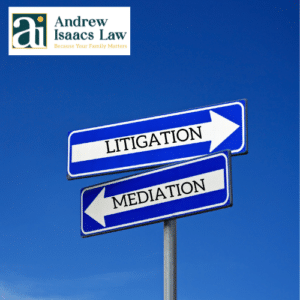


Resolving finances when going through a divorce can be a stressful and overwhelming time. Therefore, it is important to consider your options in helping you to reach an agreement. One option is to mediate, and this process has been successful for many parties.
In this article we will explain about mediation and litigation to help you decide which option may be best for you.
It is an out of court process in which both parties meet with a mediator to resolve their issues following separation. Mediation can resolve financial disputes as well as disputes over child arrangements. A mediator is a trained professional who remains neutral and aims to help the parties to reach an agreement.
Mediation can take place in person or online depending on your what is best for all involved.
However, it is important to note any agreement reached at mediation is not legally binding and the agreement will need to be embodied in a consent order and approved by the court to prevent all future claims against each other.
Mediation is not usually suitable if there has been domestic violence, and this is a satisfactory exemption for not having to engage in mediation.
Mediation will also only work and have a chance of being successful if both parties are willing to engage in the mediation process. If one party does not want to mediate, then it is likely mediation will not be effective in those circumstances.
For parties who are looking to minimise costs and believe they can work together with the other party and a mediator to reach a resolution.
Mediation could still be a successful option even if you resolve some of your issues and not all of them. This will narrow down what you need to litigate on and could save in legal fees.
It is important to note if you intend to issue court proceedings, then you be will expected to attend a Mediation Information Assessment Meeting (MIAM) prior to applying to the court unless you are exempt. One of the accepted exemptions is domestic violence.
A MIAM is an initial meeting with a mediator to consider where your matter can be resolved through mediation and without going to court. Unless exempt A MIAM certificate will need to be obtained from a mediator before court proceedings can be issued.
This is when the parties are unable to reach an agreement and therefore one party makes an application to resolve the dispute through court.
One court proceedings are issued the case is timetabled for various hearings and directions. The parties present their case to a judge who will decide at the final hearing should settlement not be reached prior to this.
It is important to note that even if court proceedings are issued many cases settle by agreement prior to the final hearing.
Choosing between mediation and litigation requires careful consideration. These are some factors to help decide.
If you believe neither mediation nor court is suitable, an alternative option is for the parties to instruct solicitors to negotiate an agreement on your behalf.
Either way it is always important to obtain legal advice following the breakdown of a relationship.
Our Family Lawyers have a wealth of experience in dealing with children and financial matters. Contact us today to arrange a fixed fee consultation to find out how we can help you.
Article Dated 23/06/2024
Call us now, our phone lines are open 24 hours a day, 7 days a week 01302 349 480 or fill out our enquiry form here
Our friendly staff are on hand to answer any of your questions.